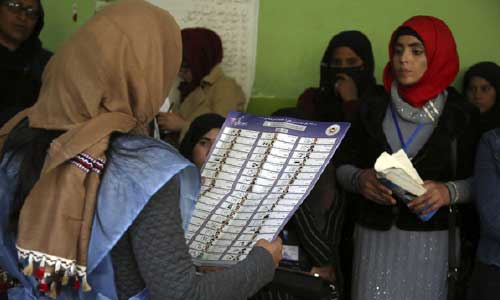Generally, the parliamentary elections is a great milestone towards institutionalization of democracy in the country but assessing the election cos and pros from different views and glasses will help us to learn necessary lessons for better management of next elections. The appraising aspects of the elections, which appreciated by all the stakeholders, were consist of brave participation of people, active awareness of media and the sacrifices of security forces across the 32 provinces of the country. Nevertheless, there were also some negative issues such as insecurity disruption and logistical and technical mismanagement.
Regarding participation of people and resistance of security forces, all the national and international stakeholders’ appreciated braveness of people. the United Nations Assistance Mission in Afghanistan (UNAMA) said in a statement released on October 20 that it was “encouraged by the high numbers” of Afghans who braved security threats and waited long hours to cast their votes. UNAMA described it, as “the first completely run by Afghan authorities since 2001,” was an “important milestone in Afghanistan’s transition to self-reliance.” Thus, The NATO Secretary-General Jens Stoltenberg commended “the millions of Afghan men & women who have exercised their democratic right to vote & the Afghan security forces who have provided security for the elections despite great challenges. Other foreign diplomats, who visited the voting process in various polling stations in Kabul city, also praised the people for their widespread participation in the elections.
Thus, the Afghan officials warmly appreciated the vast participation of people; the president Ashraf Ghani calling the people said, “You proved to the Taliban that this nation will not surrender to anyone.” For now, Kabul can be upbeat about the process. “Great people of Afghanistan, thank you! By casting your votes, you sent a message to the world that you do not want violence; you demonstrated your determination through democracy,” However, if past elections are any precedent, Afghanistan’s strongmen and the various factions vying for power are likely to question the election results if their candidates fail to win.
The Vice President Sarwar Danish also praised Afghan people for their high turnout to the elections across the country. He termed the high and intelligent turn out of the people as the most beautiful season of the new Afghan democracy. “While there was intense security threats, the proud women and men of Afghanistan proved that they will never return to the dark past days” the Vice President said. “However, it was the first elections that was fully managed and led by the Afghan government, civil and military Afghan institutions and showed the managerial capability of the Afghan government in leading the big national processes” he added.
Whereas, the Chief Executive Abdullah Abdullah appreciated the vast participation of people but he also criticized the Independent Election Commission (IEC)’s shortcomings in election and accepted that some of the people were deprived of their voting rights. “There is no justification for the repetition of failures, and clear answers should be given to the people,” Abdullah said.
The leader of Hezb-e-Islami Gulbuddin Hekmatyar claimed that the election commission has “deliberately” closed polling stations in some regions despite being assured of the security of the centers. Hekmatyar said that the election commission “deliberately” has not sent the election materials in some polling centers despite they have been assured of its security. He said it was a “ridiculous” election and that it the new parliament could represent only one million people out of 30 million population. “It [the elections] will not only solve the problems but it will also increase the issues,” Hekmatyar said.
A number of political parties’ representatives also criticized the election process, saying the voting centers in some areas have been deliberately closed to people. “The votes of those centers that did not use the biometric system should be announced invalid. We will wait up to the next two days for a complete report,” Noorul Rahman Akhlaqi, a member of Jamiat Islami Leadership Council said.
Muhammad Nateqi, the deputy of Afghanistan Wahdat-e Mili party stressed, “They planned to organize fraud and irregularities in certain areas with indicating that the biometric system is not working.” More than 2,500 candidates are contesting for the Wolesi Jirga or the 249-seat lower house of the parliament. Most of the candidates stand independently as the country did not have many regular and standard political parties.
Finally, the chairman of IEC, Abdul Badi Sayad confessed the shortcomings but vows to investigate the mishandling of the weekend’s problem-plagued legislative ballot. “We have assigned a commission to investigate the mismanagement and violations, including the late opening of the centers and use of biometric devices,” Sayyad told reporters on Monday. “Anyone who has neglected or is involved in shortcomings will be punished.” “The election materials were not sent to 97 polling centers on the first day of the voting but it was opened on the second day,” said the chairman of the commission Abdulbadi Sayad.
Initially the election was planned to be held in on Saturday but the IEC officials extended the voting to late Sunday as scores of polling centers were not open or run on Saturday after long delays due low attendance of election workers. Overall, the elections covered 32 out of the country’s 34 provinces. Voting in Kandahar and Ghazni provinces has been postponed due to security reasons.
In general, nearly nine million voters, out of nearly 13 million eligible Afghans, were registered to take part in the process and elect their lawmakers for a five-year term. While from the total registered numbers over four million Afghans, with 33 percent of them women, cast their ballots during the two-day elections due to security threats and mismanagement of the election. However, according to IEC, the turnout figure does not include those who voted on Sunday and the remaining two provinces of Ghazni and Qandarhar.
Home » Opinion » Assessing the Parliamentary Elections Through Different Glasses
Assessing the Parliamentary Elections Through Different Glasses
| Mohammad Zahir Akbari

